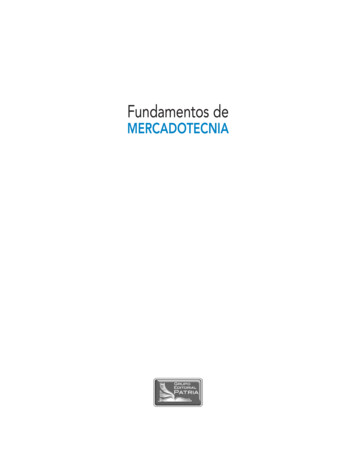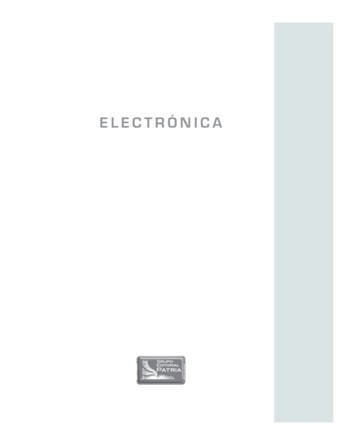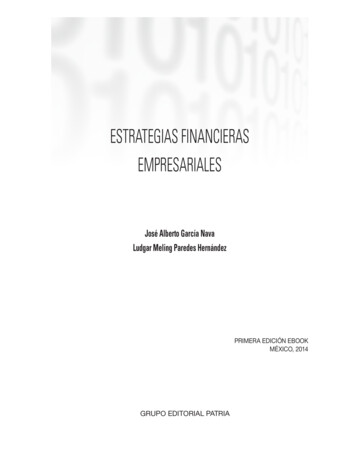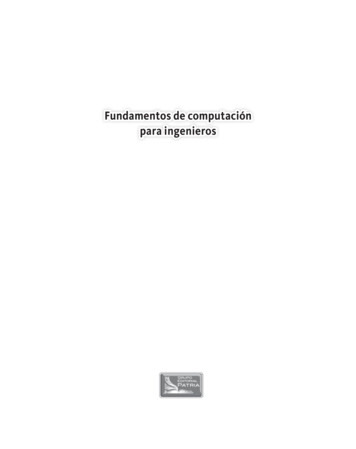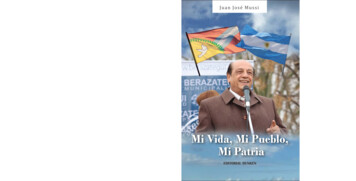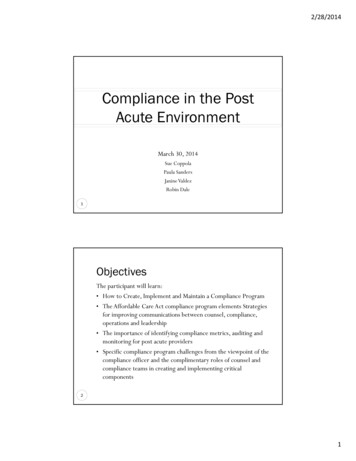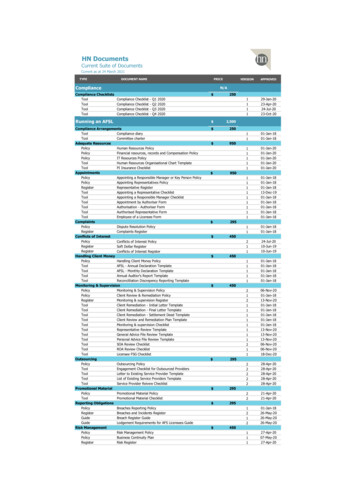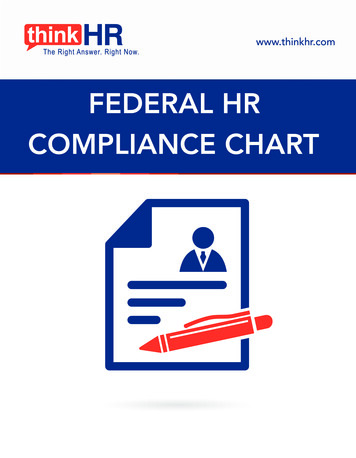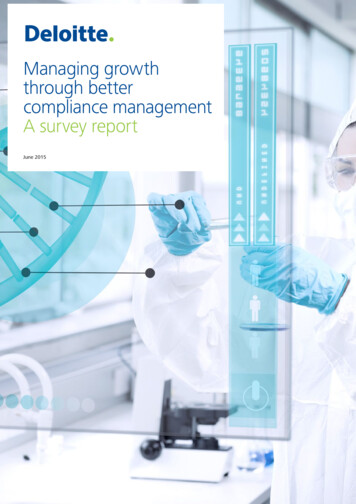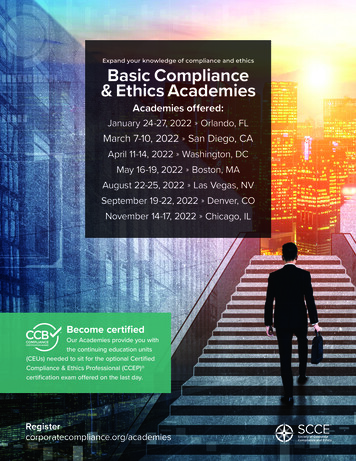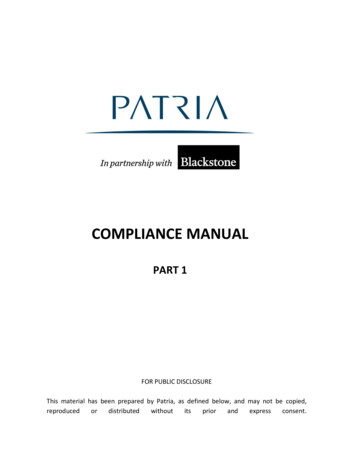
Transcription
COMPLIANCE MANUALPART 1FOR PUBLIC DISCLOSUREThis material has been prepared by Patria, as defined below, and may not be pressconsent.
Technical SheetTitle:Area in charge:Patria Compliance Manual Part 1 (“Manual”). For the purposesof this policy, Patria or Manager means Patria InvestimentosLtda., its subsidiaries, affiliates or parent company, in thelatter case, if and when applicable.ComplianceExecutive Officer in charge: Legal and Compliance OfficerDescription of the Manual: This is a Compliance Regulatory Manual pursuant to CVMInstruction 558/15. It contains the rules and proceduresconcerning the Policy on Personal Investments, theCompliance, Internal Controls and Conformity Policy set forthin CVM Instruction 558/15, the Policy on Apportionment andDivision of Orders, the Confidentiality and Information SecurityPolicy, the Voting Policy and the Training Policy.Application:All employees of Patria, as defined below, in addition toservice providers engaged in temporary work on the premisesof Patria, temporary employees, trainees and interns. Certainpolicies comprising this Manual will also apply to direct familymembers, as defined.Date of approval:August 2017Approved by:Legal and Compliance CommitteeDate of Publication:August 2017Available at:Patria web site (www.patria.com) and the Intranet1
CONTENTS1.DEFINITIONS . 32.INTRODUCTION. 53.SCOPE . 74.EXHIBIT I - POLICY ON PERSONAL INVESTMENTS . 85.EXHIBIT II - COMPLIANCE, INTERNAL CONTROLS AND CONFORMITY POLICY SETFORTH IN CVM INSTRUCTION 558/15 . 116.EXHIBIT III - POLICY ON APPORTIONMENT AND DIVISION OF ORDERS . 187.EXHIBIT IV - CONFIDENTIALITY AND INFORMATION SECURITY POLICY . 258.EXHIBIT V - VOTING POLICY . 279.EXHIBIT VI - TRAINING POLICY . 31This is a free translation of a document originally written in Portuguese. In the event of anydiscrepancy between this translation and the original document, the original documentshall prevail. Translations should not be considered exact and in some cases may includeincorrect language.2
1.DEFINITIONSFor the purposes of this Manual, the following definitions apply:Fiduciary Manager: Patria, or any institution hired to provide fiduciary managementservices to the Funds, in accordance with prevailing legislation.ANBIMA: Brazilian Association of Financial and Capital Markets Entities.Business Area(s): the asset management areas of Patria, entitled Private Equity (includesPIPE strategy), Infrastructure, Real Estate (includes Agribusiness strategy) and PrivateCredit.Blackstone: The Blackstone Group LP, a foreign third-party asset manager holding an equityinterest in Patria.Managed Portfolio(s): portfolios managed by the Managers.COAF: Financial Activities Control Council.Customers or Investors: all those with access to the products or services of the Managersthrough payment of a consideration. They can be institutions of public or private law,private individuals or legal entities.Code of Ethics: Patria’s Code of Ethics and Rules of Conduct, which represents a separatedocument from this Manual, and is also an integral part of the Patria Compliance Program.Employee or Employees: all those with an employment relationship, position, function,corporate business or contractual relationship, whether temporary of full-time, with Patria.Private Credit: financial assets representing non-sovereign debts or obligations.CVM: Brazilian Securities Commission.Management Officers: Officers responsible for managing the securities portfolios.Distributor: institution hired to provide the distribution service for the shares of the Funds,pursuant to prevailing legislation.Direct Family Members: spouses, companions, children, step-children and any others,provided the live under the same roof as the Employee.Reference Form: as per Exhibit 15-II of CVM Instruction 558/15.3
Fund(s): investment funds managed by the Managers.Illiquid Funds or FIP(s): equity investment funds regulated by CVM Instruction 391/03,under the management and administration of the Managers.Liquid Funds: investment funds regulated by CVM Instruction 555/14 and managed by theManagers.Confidential Information: business plans, personal information, procedures, strategies,business information, conditions of agreements or other documents, business proposals,theses, know-how, corporate structures, financial structures, computer programs and anyother information involving the business of Patria and its customers.Inside Information: material information, not in the public domain, which mayconsiderably influence the decision of market investors to sell or purchase certainSecurities.Patria or Managers: Patria Investimentos Ltda., Patria Infraestrutura Gestão de RecursosLtda., TERA Capital Gestão de Recursos Ltda. and the connected entities in Brazil andoverseas.Compliance Manual or Manual: This document, with the compilation of the CompliancePolicies, available to the general public.PEP ou PPE: Politically Exposed Person, in accordance with the definition in CVMInstruction 301/99.Securities: shares, convertible securities (debentures), warrants, derivatives (exchange- orOTC-traded, including interest rate swaps, futures and options), share certificates andwarrants, among other securities available on the financial and capital markets of Braziland other countries of Latin America, as defined in the legislation and regulations in Brazilor in other jurisdictions, as applicable.Vehicles Managed: Funds and Managed Portfolios managed by the Managers.4
2.INTRODUCTIONPatria has prepared this Manual in order to maintain the constant obligation of fullcompliance with the rules that apply to it, which also reducing the risks inherent to thenature of its business. Patria must abide by prevailing legislation, especially the rules andguidelines established by the CVM and ANBIMA, in addition to certain rules of otherjurisdictions that apply to it when operating in foreign markets.Patria currently performs third-party asset management activities through investmentfunds organized in Brazil, in addition to fiduciary management of FIPs. Patria is part of acorporate group of companies headquartered Brazil and with a presence in several otherjurisdictions. The rules set out here apply equally to all those companies.Patria has four (4) main business areas: (i) Private Equity (including the PIPE strategy –private investments in public equity); (ii) Real Estate (including Agribusiness strategy); (iii)Infrastructure and (iv) Private Credit; without prejudice to other strategies it may use,including on foreign markets, especially in Latin America.In 2010, Patria entered into a formal association with Blackstone, one of the world leadersin investments, which acquired a forty per cent (40%) equity interest in Patria. Within thescope of this partnership, Patria also manages, or can manage, funds that replicateBlackstone’s overseas investment strategies, such as the multimarket fund that invests inshares of overseas funds. In addition, the relationship with Blackstone expands the level offunds available for addressing the needs of Patria investors.The purpose of this Manual is to establish the main ethical, operating and regulatoryguidelines, and it does not intend to deal at great length with all the laws, regulations andrules applicable to its activities. Also, this Manual seeks to set out the internal proceduresand controls compatible with the nature, complexity and risk of the investments made bythe Managers.The policies set out in this Manual will be periodically reviewed, updated and/orsupplemented, and will always be available to the employees on the Patria website andintranet.5
For the purposes of this Manual, all and any request that depends on authorization,guidance or clarification from the Compliance area must be forwarded by e-mail to:compliance@patria.com.Incidents of non-compliance with the content of this Manual must be obligatorily notifiedto the Compliance area and evaluated by the Legal and Compliance Committee. Thiscommittee will then assess whether there is a case for applying disciplinary measures, suchas a verbal or written warning, suspension of the contract of employment or still further,dismissal with or without cause, among others. Recourse to the internal disciplinaryprocess does not seek to limit the imposition of the appropriate legal measures forrepairing any damage caused to Patria or its customers and investors, who may take theappropriate measures for any reimbursement, including financial reparation, as the casemay be.6
3.SCOPEThis Manual must be respected by all employees of Patria, who should read, understandand fully abide by the provisions set out herein.Certain policies comprising this Manual will also apply to direct family members, as definedin the respective policies of this Manual.In the event Patria maintains temporary relations, involving business, contracts or trust,with third parties, depending on how these were entered into, and on the nature of theinformation to be exchanged within the scope of that relationship or contract, it may benecessary for the third party to adhere to the policies of this Manual.7
4.EXHIBIT I - POLICY ON PERSONAL INVESTMENTS4.1.PurposeThe purpose of the Policy on Personal Investments is to set out the guidelines for thepersonal investments of the employees so as to avoid situations that might be construed asconflict of interests or the improper use of inside information of the Managers and theirInvestors. The purpose of the Manual of the Policy on Personal Investments, an integralpart of Compliance Manual 2, is to define the rules and procedures regarding employees’personal investments.4.2.General GuidelinesEmployees must put the interests of the customers in first place, refraining from closingtransactions and engaging in activities or maintaining relationships that might interfere, orappear to interfere in the decisions they take.Generally speaking, Patria expects its employees to dedicate their working hours toattending only to the interests of Patria and its Investors. Thus, employees’ personalinvestments and other personal financial transactions must adhere to the philosophy orlong-term investment, rather than speculative, short-term trading. Patria emphaticallydiscourages trading based on rumors.The Compliance area is responsible for monitoring the personal investments informed bythe employees and, in cases where it believes there are grounds for suspicious conductthat breaches the provisions of this Policy, submits these for appreciation by the Legal andCompliance Committee so that the appropriate measures are taken.4.3.General Principles of Patria’s Policy on Personal InvestmentsEmployees must preferably operate as passive investors through investment funds or otherliability-based products offered by financial institutions.While in possession of Inside Information about the issuer of any assets, employees areforbidden to purchase, sell or recommend the purchase or sale of those assets for their8
account or that of third parties, even where such information has been obtained as a resultof them doing their job at Patria.The following practices are also prohibited: closing business deals based on any confidential information they are aware of, orencouraging others to do so, regardless of the manner in which the information wasacquired, and whether or not the is privileged; buying and selling financial assets based on knowledge about the negotiations proposedby investors, customers, suppliers, service providers or by Patria itself or from still-topublished reports.Employees’ investments must be made using their own financial wherewithal. Employeesmust not ask for or accept any preferential terms and conditions in connection with anypersonal trading or investment.Employees must limit the trading risks of their personal account. Trading or activities thatrepresent a high degree of financial risk for the employee’s situation can be sources ofdistraction, affecting their ability to carry out their professional responsibilities effectively.Employees must abide by the personal investment policies and procedures that apply tothem, in addition to the rules provided for in the Code of Ethics, including any specificrequirement to disclose and approve, in advance, the investment transactions deinvestment, so that potential conflicts can be analyzed before a personal trade is executed.4.4.Managers’ Investments - Own PortfolioPatria may invest in Funds managed by Patria, pari passu with commitments assumed bythe Investors. These investments may be made through the Manager, its affiliates orthrough its partners or investment vehicles. Managers do make other trades with securitiesfor their own portfolio and they ensure conservative cash management while allocatingfunds primarily to government bonds, repurchase agreements (repos), liquid fixed-incomeassets or daily liquidity investment funds held in a first-line Brazilian bank.9
4.5.Penalties within the Scope of the Policy on Personal InvestmentsFailure to comply with the rules set forth herein and in the Manual of the Policy onPersonal Investments will be grounds for disciplinary measures, which may includedismissal and, if applicable, forwarding information to the appropriate regulatory and selfregulatory bodies.Even if no longer contractually attached to Patria, employees may be held personally liablefor any wrongful or unlawful act committed during the period in which they wereemployed with the Fund Managers and therefore be subject to applicable regulatory, civiland criminal penalties.Patria may also require employees to undo or cancel any trades executed that are not inconformity with this Policy and may take any additional legal measures that may beapplicable.10
5.EXHIBIT II - COMPLIANCE, INTERNAL CONTROLS AND CONFORMITY POLICY SETFORTH IN CVM INSTRUCTION 558/155.1.PurposePatria’s Compliance area is responsible for preparing and maintaining the Managers’Compliance Program which includes periodically reviewing and updating Patria’s policiesand code of ethics. Likewise, Patria is responsible for deploying internal controls andadherence tests to monitor the effectiveness of said policies and for related trainingprograms.The asset management companies’ Compliance Program was developed in order to fulfillthe obligations set forth in CVM Instruction 558/15, the self-regulatory codes issued byANBIMA, of which Patria is a member, and other rules, guidelines and advice issued by saidentities, among other Brazilian and international best practices applicable to Patria’sbusiness.With support from the Legal and Compliance Committee, the Compliance area is primarilyresponsible for overseeing the Managers’ internal rules, controls and procedures in orderto mitigate operational, regulatory, reputational and legal risks involved in its business.Therefore, the unit is equipped with human and resources and IT structure as definedherein.5.2.Compliance OfficerUnder article 22 of CVM Instruction 558/15, the Legal and Compliance officer is responsiblefor implementation and compliance with this instruction’s rules, policies, procedures andinternal controls.In their capacity of Legal and Compliance Officer, the officer reports directly to theExecutive Committee, has full powers to implement the Compliance Program, and isfamiliar with financial and capital markets legislation and regulations.11
On carrying out activities in the officer’s purview as stated in this Manual or elsewhere, heor she may use electronic systems and / or legal services provided by attorneys orcompliance consulting firms to support and assist them in their work.5.3.Legal and Compliance CommitteePatria’s Legal and Compliance Committee enjoys autonomy to decide legal and complianceissues for the Managers. The committee consists of the following members: (i) ExecutiveCommittee member responsible for Compliance, (ii) Management Committee partnerresponsible for Compliance; (iii) the Legal and Compliance Officer, and it is chaired by theLegal and Compliance Officer. Other employees may be asked to participate on specificoccasions as listeners and contributors.The Legal and Compliance Committee meets every six months or whenever necessary if ameeting is called by any of its members.Decisions must be made by a majority vote of attendees and minutes of meetings must bedrafted, which may be in a summarized format.The Legal and Compliance Committee’s responsibilities include: Defining, disclosing and reviewing procedures in this Manual, Patria’s Code of Ethics andother Policies; Provide advice for employees in case of questions concerning the application of anyPatria’s Policies that may not have been directly explained by Compliance area; Examine issues and make certain decisions and approvals involving risk, compliance,anti-money laundering and terrorist financing, anti-corruption and contingency; Examine complaints or signs of conduct potentially contrary to internal Policies and legalor regulatory requirements; assess any need to notify regulatory bodies or the COAF,and examine and discuss internal sanctions, to then submit such matters to theExecutive Committee if deemed necessary; Provide for wide dissemination and application of the ethical precepts involved indeveloping the Managers business;12
Treat all matters that come to their knowledge as absolutely confidential and preservethe interests and corporate and institutional image of the Managers, also ensuringconfidentiality for any persons reporting infractions or signs of infractions, even whenthey do not so request, except in cases in which there is an obligation determined by lawor regulatory rule or judicial decision ordering disclosure of the information; Ask for support from internal or external auditors or other outside consultants whenevernecessary; Resolve on situations that may be characterized as conflicts of interest, either personalor professional; and Resolve on and apply any sanctions for employees, and submit to the ExecutiveCommittee proposals for the application of penalties, for the latter’s appraisal, whendeemed necessary.The Legal and Compliance Committee must have full autonomy to perform its functionsand must act under the direct coordination of the Legal and Compliance Officer. Thematters dealt with by this Committee are strictly confidential.If deemed necessary or convenient, the Chairman of the Committee, a position exercisedby the Legal and Compliance Officer, may submit any matter within the competence of thisCommittee to the Executive Committee for its consideration or resolution.5.4.Role of Compliance and ResponsibilitiesThe following activities are the primary responsibility of Compliance: Provide advice and consultative support to the business areas, internal committees andExecutive Board in relation to rules and standards issued by regulatory and selfregulatory bodies; Supervise compliance with the rules set forth in Patria’s Code of Ethics, ensurefulfillment of duties owed to Customers and Investors, anticipating and implementingprocedures to mitigate any conflicts of interest, as well as ensuring compliance with theregulatory prohibitions set forth in article 17 of CVM Instruction 558/15; Together with Human Resources, arrange employee training programs;13
Assist with the identification, documentation and evaluation of risks associated withcompliance for the activities of the Managers with the normative precepts, assisting inthe analysis of the impact of offering of new products and services or relationship withcertain investors that involve levels of risk; Coordinate the work of reviewing and updating the regulatory forms, in particular theReference Form, as well as the policies set forth in article 14 of CVM Instruction 558/15and others for which publicity is required by ANBIMA; Monitor the main rules, guidelines and alerts issued by regulatory and self-regulatorybodies and keep an updated regulatory agenda containing all deadlines defined by suchbodies, possibly using electronic systems or spreadsheets for this purpose; Run periodic tests in order to monitor and evaluate the effectiveness of Patria’s policiesand the Managers’ control systems, make suggestions and monitor improvementsactions resulting from these tests, for which purpose they may use the electronicsystem; Run tests on access controls for computer resources (internal directories and systems),as well as other tests to verify the functionalities of the electronic systems used byManagers and the effective availability of backups of documents and systems; Develop an internal control report as per article 22 of CVM Instruction 558/15, whichmust be prepared annually and made available to the Executive, Legal and Complianceand Management Committees by the last working day of January (based on theadhesion tests referred to in the item above); Monitor Risk Management Policy, fully observing the guidelines of art. 23 of CVMInstruction 558/15 and art. 34 of the ANBIMA Code and best practices determined byANBIMA, by periodically running tests; Arrange response for inspections and supervisory activities of regulatory and selfregulatory bodies, outsourced audits and due diligences, interface between the latter’srequests and Patria’s internal units; Supervise and monitor the execution of anti-money laundering and terrorist financingprocedures, subject to specific Policy and procedures to mitigate the occurrence ofatypical situations and allowing their immediate identification if they do occur and notifyCOAF;14
Cross border issues: assess applicable regulatory issues in the foreign jurisdictions withwhich Patria conducts transactions or may obtain registration engaging specializedadvisory services in said foreign jurisdictions; Manage the Policies on External Activities and Personal Investments of Employees,including coordinating the process of obtaining and granting approvals whenappropriate, and periodic monitoring; Inform the CVM whenever they detect, in the exercise of their attributions, theoccurrence or signs of violation of the legislation which the CVM is responsible forsupervising; Establish additional controls for engaging the services of third parties as per CVMInstruction 558/15 (i.e. obtain the Investor’s authorization to engage third parties; Monitor employees’ corporate email whenever deemed necessary; Annually or more often, with support from Human Resources and Legal departments,ascertain whether any “key employees”, especially controlling partners andmanagement officers, are involved in administrative processes brought by regulatory orself-regulatory bodies, criminal proceedings of any type, or other cases that may lead tocontingencies for the Managers and which therefore, may have to be publicly disclosedpursuant to CVM Instruction 558/15; and Through CVMWEB, between May 1 and May 31 each year, check to confirm that theinformation on the registration form of the Managers as set forth in CVM Instruction510/11 is still valid, and update said registration form whenever any of the data on it arealtered.Whenever deemed necessary or appropriate, the Legal and Compliance Officer may raiseany matter within their competence for consideration or deliberation by the Legal andCompliance Committee.5.5.Maintenance - Reference Form and other FormsAs per CVM Instruction 558/15, Compliance must send the Reference Form through CVM’selectronic system by March 31 each year.15
When preparing and reviewing the Reference Form, Compliance must coordinate the workwith the areas that hold the information to ensure that the information herein is true,complete, does not mislead investors and uses plain, clear, objective and concise language.Compliance will also be responsible for overseeing other regulatory forms, including butnot limited to those required for ANBIMA, according to the regulatory agenda / internalsystem maintained by Compliance, and in accordance with Brazilian regulations applicableto Patria’s operations.5.6.Annual Compliance Review and Report as per article 22 of CVM Instruction558/15At least once a year, Compliance must conduct a complete review of all ComplianceProgram content, which includes this Manual, the regulatory agenda, training program,reviews of forms and adherence tests as required in item 6.4 above.As a result of the annual review, Compliance must prepare a report on the conclusions ofinternal controls referred to in article 22 of CVM Instruction 558/15, to be submitted to theExecutive Committee by the last business day of January each year, relating to the calendaryear immediately prior to the date of delivery, containing:(i)conclusions from the examinations made;(ii) recommendations as to possible shortcoming, and determining remediation scheduleswhen applicable; and(iii) the report of the officer responsible for managing securities portfolios or the officerresponsible for risk management where appropriate, concerning shortcomings foundin previous verifications and measures planned, in accordance with a specific schedule,or measures effectively adopted to remedy them.This report should be made available to the CVM at Patria’s headquarters.5.7.Additional Monitoring - Managed Portfolio16
Monitoring is required for the purpose of engaging third parties to provide ancillaryservices to which the portfolio Fund Manager may resort if applicable.In addition to the monitoring for Anti-Money Laundering (AML) purposes described in thepolicy on Anti-Money Laundering and Terrorist Financing, Compliance must ensure that therequirements set forth in article 26, paragraph 2, of CVM Instruction 558/15, in cases inwhich providers of fund management, custody or control services have to be engaged, orfor any other service providers retained at Investors’ expense.In addition, Compliance must check whether any special obligations agreed in amanagement contract or other instruments executed directly with Investors of ManagedPortfolios are being duly observed.17
6.EXHIBIT III - POLICY ON APPORTIONMENT AND DIVISION OF ORDERS6.1.PurposeThis Policy defines guidelines and procedures required to ensure fair allocation of ordersand investment opportunities between the Funds. To do so, this Policy will separatelyaddress allocation guidelines for (i) low liquidity funds and (ii) high liquidity funds.6.2.General Allocation GuidelinesThe Managers adopt investment opportunity and order allocation practices to ensure thattrades are made in accordance with (i) Patria’s Investment Decision and Asset Allocationand Selection Policy; (ii) each Fund’s investment policy; or (iii) another instrument that maybe agreed directly with Investors.Employees involved in Management recognize the importance of their fiduciary duty andequitable treatment of clients, including their duty to (i) ensure isonomic practices whenallocating orders and investment opportunities between the Funds, AND when allocatingexpenses between them; (ii) obtain the best conditions for the Funds’ trades; and (iii)disclose potential or materialized conflicts of interest that may be identified in their tradingactivity.6.3.Risk analysisDue to the nature of the Funds managed by Patria and the existence, as a general rule, ofclearly defined mandates in the investment policies stipulated in the Funds’ regulations,there is a is relatively low level of exposure of the Managers to conflicts of interest whenallocating investment opportunities. However, in view of the importance of theseprocedures, routines are constantly monitored by the respective business areas and theirInvestment Committees, and tested by Compliance annually or more often.In this respect, any overriding of an opportunity or conflict should be discussed by therespective areas. Decisions to allocate investment must be formalized as defined in theprocedures below.18
6.4.Investments in Illiquid Funds6.4.1.Procedures for Allocation of OpportunitiesAs a rule, put and call orders for illiquid liquidity assets must always be issued with preciseidentification of the Fund on behalf of which they are to be executed.Given the abovementioned nature of investment policies of FIPs managed by Patria, as arule, there is no overriding of assets to be allocated to the Funds.However, in the event that any investment thesis is identified by the Management Officersor Investment Committee of the respective business areas as being applicable to more thanone Fund, there may be a decision to allocate for Funds from different areas, provided thatcriteria for reasonableness and fairness between clients are analyzed, such as: The nature of the investment in question in relation to each FIP’s investment policy; The size and type of investment in relation to the FIP’s committed capital and availablecapital; Restrictions on concentration by investment, sector, or any other restrictions applicableto each FIP; Contractual issues or specific limitations of each FIP’s mandate; Source of investment opportunity; The focus and investment phase of each FIP at the time of the opportunity; Co-investment opportunities as per item 7.4.2 below; and Other conditions that may be evaluated by the respective Investment Committees.
4 Fund(s): investment funds managed by the Managers. Illiquid Funds or FIP(s): equity investment funds regulated by CVM Instruction 391/03, under the management and administration of the Managers. Liquid Funds: investment funds regulated by CVM Instruction 555/14 and managed by the Managers. Confidential Information: business plans, personal information, procedures, strategies,


